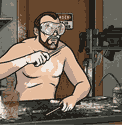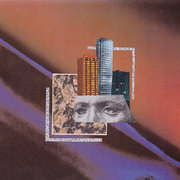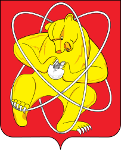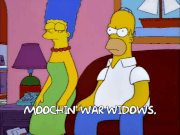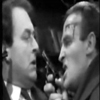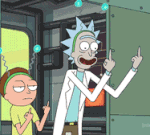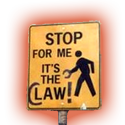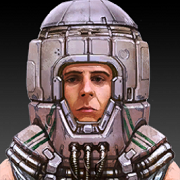|
War is a loving annoying thing to explain to civilians, so most of us either skip the subject entirely, bury our personalities in internet forums, or drink to excess. A few nerds throughout history have taken, in their quest to make sense of the senseless, to the literary arts: poetry, fiction/novels, and even the occasional memoir or research project. These are their…stories. The following list is delineated by genre and war. If you’d like a contribution of your own added to the OP, please make a note in your post. Otherwise, discuss! Fiction The Things They Carried Tim O’Brien (Vietnam) Taught in high schools, this novel is made up of several chapters of close-strung short stories involving the same characters and a fictional narrator that closely resembles the actual author, who was an infantryman in Vietnam. This “realistic” fiction is commonly deployed in war literature, for one or more practical reasons: protecting identities/actions, filling gaps in memories, “improving” the point of a story, etc. TTTC has given us several famous lines including, “There’s no such thing as a true war story.” It’s a quick read, and highly recommended. Dispatches Michael Herr (Vietnam) Michael Herr was a journalist who covered Vietnam and traveled around the country, putting himself at the sort of risk that many journalists notoriously avoided during the war. He saw just about everything the regular line troops saw, and wrote it honestly. Dispatches is not journalistic nonfiction or literary journalism, it is fictionalized (this is not immediately apparent to some readers, including myself). But if you have spent any time in a war, it rings drat true. Michael Herr contributed to the writing of Apocalypse Now, and it shows in both the tone of the film and the tone of the book. Fun fact: Next on my reading list is The Sympathizer, which won the Pulitzer and is a Vietnamese-American’s response to the single-sided narrative at work in Apocalypse Now. Redeployment Phil Klay (GWOT/Iraq) US Marine Corps public affairs officer pulled out all the stops for this National Book Award winning collection of short stories about shooting dogs, taking credit for your buddy’s kill, loving strippers, the Vietnam-whorehouse-burning-stack-of-quarters urban legend, and more. The stories are hit or miss, and he isn’t shy about redeploying the stories and legends (see above) we’ve all heard a million times over for a fresh, civilian audience. He’s at his best when he writes about a chaplain advising a company of Marines that have lost themselves in the killing, or about a Foreign Service Officer navigating the corrupt (on both sides) system of aid-giving in Iraq. Slaughterhouse Five Kurt Vonnegut (WWII/Europe) Kurt Vonnegut writes about farts, poops, time travel, musty basementy mushroom smells of a wet-dream cleanup, tits, and dry-heaving oneself to literal death in the scorched basement of post-bombing Dresden wreckage. A quick read, and a good read. Vonnegut doesn’t waste your time getting to the point too quickly (so that you might make sense of things before they’ve time to sink in) or spoon-feeding you the point. His moves and their aftereffects sneak up on you, ripping the foundation out from your smirk like it was a barn in Dresden. So it goes. Catch-22 Joseph Heller (WWII/Europe) Another quintessential WWII novel. The Air Force pilot Yossarian realizes he’s going to die if he keeps flying bomber missions, but his only way out is to fake severe insanity so they’ll take him off the line. But it doesn’t work so easily as he’d like, hence the book title’s survival into present vernacular. Anyway, the moments of comedic idiocy familiar to anyone who’s had to sweep snow, paint rocks, shine something shiny, or whatever like that will be very clear, and enjoyable. Nonfiction Homage to Catalonia George Orwell (Spanish Civil War, expat perspective) George is at it again. This time he drags his wife with him to Spain so he can cover the war as a “journalist” and is given a soldier’s outfit and command of a squad as soon as they realize he’s not an idiot. He writes the war as a soldier on a foggy front line with a bunch of fascist-hating rebels, the losing minority within the losing side of a proxy war (communists vs. fascists) in the years preceding WWII. Orwell’s own side is forced out by Russian-supported communists, and he barely escape a purge that several of his friends do not. He also gets shot in the neck. Orwell’s plain-spoken prose does a great job here, and contemporary editions of this book shift his two long-winded chapters on the political nuances of the war into an appendix (a mistake, in my opinion). Where Men Win Glory Jon Krakauer (GWOT/Biography) Jon Krakauer squeezes his political agenda into a Pat Tillman biography. No doubt, Tillman is polarizing and generally a badass at whatever he did – including pissing off his team/squad/platoon. The truth that might resolve all of the conspiracy theories about “what really happened” will probably die with the Rangers who were there. So it goes. Tillman’s death was mishandled at multiple levels, and Krakauer definitely goes a step too far in making it the fault of the entire Bush administration AND the military-industrial-congressional complex, but whatever. That stuff is so transparent that anyone fooled by it deserves it. The book is still good, and Krakauer can still report like nobody else. Worth a look into why some crazy rear end dude would leave a multi-million NFL contract to fight dirt farmers for freedom and fratricide. On War By Carl von Clausewitz (Europe/philosophy/whatever) War is an extension of politics, or so people say after reading this. That’s not quite accurate, but close enough to fool most people into believing you’ve read Clausewitz. It’s sort of the Western answer to Sun Tzu’s Art of War, perhaps in conjunction with Machiavelli’s The Prince. I’ll be honest, I last read this over 10 years ago. It uses historical examples to explain important military stuff like flanking good, logistics good, fog of war bad. Wikipedia does a better job than this. Poetry Brian Turner is an Iraq war veteran and poet with a strong body of work published to date. He wrote “Hurt Locker” which lent its name to the award-winning Kathryn Bigelow trainwreck about superpowered EODs that lose themselves in stateside grocery stores. The coolest poets in my opinion were minted in the WWI trenches (Wilfred Owen, Siegfried Sassoon), with notable mention going to Vietnam (Bruce Weigl, Yusef Komunyakaa). Yusef Komunyakaa wrote the most gut-wrenching poem I have ever read. It’s about the Vietnam Memorial in DC: code:HERE, BULLET code:All Quiet On the Western Front (WWI, German Perspective) You Know When the Men Are Gone Siobhan Fallon (GWOT, Dependent perspective) Rarely, a dependent writes about what it’s like, well, when the men are gone. This is the best known book out there about the contemporary state of it. On my bookshelf, still unread. Zinky Boys Svetlana Alexievich (Soviety-Afghanistan war, Soviet perspective) Translated into English. A series of interviews with Soviet soldiers who fought in Afghanistan. Supposedly depressing and typically Russian and very well regarded. On Killing David Grossman (WWII/Vietnam) How we used psychological studies from WII to improve line soldiers’ firing rates for the Vietnam war. Many soldiers were not actually firing their weapons (according to the studies), and psychological studies were applied to military training to improve soldiers’ engagement on the battlefield. Hence, On Killing. It gets deeper than that, I’m told, but I haven’t read this one yet. The Forever War Joe Haldeman (Vietnam) All I know is this forum loves this book, and I need to stop loaning out my copy. It’s a sci-fi book about future soldiers losing their contemporary lives to time-space dilation in order to fight a war light-years away, and returning to a society that literally doesn’t understand them (because they’re all old and weird or something). The metaphor is fairly straightforward. Afterwar Nancy Sherman (GWOT/Veterans) Nancy Sherman is a professor of philosophy at Georgetown. She has worked with the Navy and DoD to figure out that gosh darned Moral Injury thing people keep talking about. I had the chance to interview her recently for a piece of my own, and she is smart and cool, but I am not entirely sold on the whole moral injury concept. I think it needs to mature a little further (which could be read as a comment as much on the mental health profession and society as a comment on veterans) before we can prescribe fixes. No doubt, investigating the concept of moral injury will probably get us further into understand that civil-military divide. The problem is we don’t all digest the philosophical realities of our lives in the same way, so it’s pretty damned hard if not impossible to diagnose (let alone solve) the issues at hand. The Red Badge of Courage Stephen Crane (Civil War) Classic civil war novel about regaining honor on the battlefield. Sebastian Junger (multiple GWOT books) Pop culture slobbers all over Junger, and he makes some cool points. He also skips over a lot of the ugliness of war that other writers aren’t shy of. He doesn’t receive a lot of criticism for that, but he should. There is a strong cultural appetite for band-of-brothers platitudes about the honor of service, the unique and everlasting bonds forged overseas with battle buddies and how it just makes us so drat different (implicitly better) versus civilians. He also spins PTSD into an argument about tribalism and how disjointed modern society is, but the intellectual rigor is lacking in his work. Take it for what you will – it’s a voice lacking in previous wars’ cultural discussions, so it could be worse. Thank You For Your Service David Finkel (GWOT/society) David Finkel tells post-war pornographic tales of hell at the VA, suicidal veterans, and people whose lives were awful before they joined staying awful or getting (surprise) even worse afterwards. People eat it up in the absence of more honest investigation into the causes of why veterans are having a poo poo time at readjustment. See: Sebastian Junger. This book wouldn’t be on the list if it weren’t well recognized and lauded, which forces it into the conversation. Claimed/Upcoming Waroduce: Sympathy for the Devil Matterhorn Zeris fucked around with this message at 04:42 on Aug 17, 2016 |
|
|
|

|
| # ? Apr 30, 2024 04:05 |
|
You should add Sympathy for the Devil as well as Matterhorne for Vietnam. I am drinking and not going to write a summary now cause they are classics and deserve good ones but if you really want one I will tomorrow at some point E: Fallen Angels Great childrens book on Vietnam. Or well teenage. I read it in sixth grade...idk. The Endgame: The Inside Story of the Struggle for Iraq, from George W. Bush to Barack Obama Paperback – March 12, 2013 by Michael R. Gordon Good Iraq overview Tiger Force Some dirty poo poo Tiger Force did in Nam TIGER FORCE is the searing story of a group of elite army soldiers in Vietnam who spun dangerously out of control and went on a horrific seven-month rampage. It is also the story of how these crimes, buried by the army for decades, at last came to light through the heroic persistence of a few individuals who could not forget. Fiasco: The American Military Adventure in Iraq Book by Thomas E. Ricks How we hosed Iraq up Cobra II Great examination of the opening ground war of Iraq Waroduce fucked around with this message at 04:39 on Aug 17, 2016 |
|
|
|
Stephen Pressfield has some cool rear end books that take place in Ancient Greece and Rome. I've read a couple of his fictional works, and they're sick as gently caress. He's done some non-fictional books about war as well. Taken from Tides of War by the above mentioned author: quote:Chapter 10: The Joys of Soldiering elite_garbage_man fucked around with this message at 04:39 on Aug 17, 2016 |
|
|
|
Achilles in Vietnam is an interesting look at PTSD in Vietnam vets btw written by a VA doctor https://www.cwu.edu/~garrison/Achilles_in_Vietnam.pdf quote:Every instance of severe traumatic psychological injury is a standing challenge to the rightness of
|
|
|
|
Cool, anyone who "claims" a writeup (or wants to improve on mine) is welcome to do so, and I will add to the OP. I humbly request we err on the side of writing effortposts of our construction, in the spirit of being literary nerds. I forgot about graphic novels, but would be willing to throw in a White Donkey writeup if anyone is interested. I'm not sure what else is out there and fits the genre - Maus, maybe? Zeris fucked around with this message at 04:47 on Aug 17, 2016 |
|
|
|
For Vietnam, "Matterhorn" by Karl Marlantes is a viciously despairing yet great read. For nonfiction WWII, Rick Atkinson's "Liberation Trilogy" is great.
|
|
|
|
"Life and Fate" by Vasily Grossman is probably the most significant piece of literature I've ever read. Grossman himself was a Soviet war reporter who lived through Stalingrad and was one of the first with the Red Army to see the death camps. The book itself follows members of a Russian family. It's primarily centered around the battle of Stalingrad, but also shows glimpses of life in Moscow and in the death camps themselves. The book is extremely critical of Stalin's totalitarian regime, and as such was "arrested" by the KGB. It only got published after it was smuggled out to the west. It's a loving long book. I've read it twice, both times in Iraq when I had few distractions. But it is absolutely a worthwhile read. https://en.wikipedia.org/wiki/Life_and_Fate Some excerpts of the writing (because the last time I read it, I marked some passages to copy down in a Word file): quote:“The life that had reigned hundreds of millions of years before, the terrible life of the primeval monsters, had broken out of its deep tombs; howling and roaring, stamping its huge feet, it was devouring everything round about. The fire rose thousands of feet, carrying with it clouds of vaporized oil that exploded into flame only high in the sky. The mass of flame was so vast that the surrounding whirlwind was unable to bring enough oxygen to the burning molecules of hydrocarbon; a black, swaying vault separated the starry sky of autumn from the burning earth. It was terrible to look up and see a black firmament streaming with oil.” p39
|
|
|
|
Brian Turner's stuff is real good. Re: On War, if you want to sound smart in your IR class (or with your fellow officers if you're one of those), just read Book I. It's the one everyone quotes from that has "continuation of politics by other means" and "fog, friction, and chance." I will say that it is worth reading in its entirety.....but that it has diminishing returns as you go on. Books I-III are probably required reading if you plan on seriously reading it (as opposed to just getting a few pull quotes to impress that 20 year old in your International Relations 201 class), the remaining Books are more of that "using historical examples to make a point," which requires a fair bit of transposition since he's using direct tactical situations from the early 1800s to make his point. Not the most direct analogy to modern warfare. If you do read it, get the Howard/Paret translation (or if you can find it, the Matthijs Jolles translation), the Rapoport one is hopelessly flawed. Seriously, it's terrible and completely misses the point (it was composed in the '60s, and Rapoport was trying to make a point about how bad the "neo-Clausewitzian" Kissinger was...I don't even know what the gently caress) Also On Killing is underpinned basically by bullshit, as the studies by SLA Marshall showing US soldiers in WWII weren't firing their weapons were........not historically accurate (by that I mean they were more or less made up). Grossman's response when this was pointed out was basically "well none of his critics are published anymore, he's still revered in the Army, and I'm on the Commandant's Reading List and getting all sorts of speaking engagements, so suck it." Also Grossman has a hard on for saying that violence in our culture (specifically video games, more specifically first person shooters) is directly influencing kids to kill, to the point where he's in the pearl clutching camp of arguing that Doom was directly responsible for Columbine. I think it would be an understatement to call that line of thought problematic. On Killing is still worth reading, but go into it with eyes open and I wouldn't recommend his other stuff. Couple others, these are non-fiction The Village Bing West (Vietnam) This is arguably the definitive account of the Combined Action Platoons in Vietnam. The tl;dr is this was what we tried (briefly and incompletely) in Vietnam along the lines of COPs and local partnering before we said gently caress it and went full blown search and destroy. Fifteen Marines, a bunch of ill-equipped but (mostly) determined villagers, and the fight to keep their hamlet free from the VC. The book has been on the Commandant's Reading List for a long time, largely for its supposed counter-insurgency lessons. You'll notice that the operational approach pursued (local partnering + COP like strongholds) hasn't really worked out well in our current wars either because who knew, good tactics and operational art without a valid overarching grand strategy is pissing in the wind. Anyway, I'm not recommending it based on the COIN piece, I'm recommending it because I don't think there's been a book that has better captured the personal and often agonizing nature of that kind of way of fighting a war. The Marines suffer a 50% casualty rate...I won't spoil the end but I imagine you can guess how it turns out. When Thunder Rolled and Palace Cobra Ed Rasimus (Vietnam, Air War over North Vietnam) Ed Rasimus was a fighter pilot who did two tours in Vietnam, both flying over the North during heavy US airstrikes. His first one, When Thunder Rolled, is about him flying Thuds (big-rear end F-105s) during Rolling Thunder. More than any other book I've read, this book encapsulates the pointlessness of Vietnam at a higher level. Obviously all the books about infantry slogging through the jungle have a strong component of that, but for most of them it's a bigger leap between that and the overall strategic failure in the war. Rasimus makes that link much clearer....he has the means, himself, to destroy the SAM sites, AAA emplacements, and airfields that are responsible for shooting down his friends and killing them or consigning them to years of captivity, but he can't do anything about it in a lot of instances because it's against "the rules." And he and his buddies continue to fly North every day so they can blow up a "truck park" (jungle canopy likely without anything underneath it.) There's other books on the same subject that also make this point (Thud Ridge comes to mind), but none of them write as well as Rasimus. It's probably the single best account of flying a Thud in combat (really one of the best accounts of air combat, period), and Rasimus also gets into the dichotomy of the air war in Vietnam (or really most air wars in history)...launching out of a base in Thailand, flying north, risking his life in rather high-intensity aerial combat for 30 minutes, and then returning to a base where there's booze in the air-conditioned o-club and there's plenty of whorehouses just outside the gate. Palace Cobra is his book about his second tour, flying F-4s during Linebacker. Lots of the same stuff as When Thunder Rolled, with the added twist of being in an aerial campaign where the gloves are finally (mostly) off....but everyone knows the war is lost anyway, which is almost more depressing than the first one. However, they know they're bombing in part to get the POWs home. Those two together lend a certain heroic pathos to the whole thing. If you like When Thunder Rolled, pick up Palace Cobra, it's a short read and just as good. Also I mentioned Thud Ridge... Thud Ridge Jack Broughton (Vietnam, Air War over North Vietnam) Like I said, it's not written quite as well as either of Ed's books. However, there's a reason for that...the author was extremely pissed off while writing it. He was a Thud Vice Wing Commander during Rolling Thunder, couple of his pilots strafed a AAA emplacement that was firing on them, arguably in violation of the published ROE due to its proximity to a Soviet cargo ship. In order to prevent his pilots from being court-martialed for the ROE violation, he destroyed the gun camera footage. He admitted to the "crime" to avoid his guys going down for it, so he was convicted of destruction of government property, which was subsequently over-turned. However, by then he'd been relieved and banished to a do-nothing job in the Pentagon. He used that time to write Thud Ridge, which was subsequently published when he retired in 1968. So like I said, he was extremely pissed off while writing it, and it shows...which isn't necessarily a bad thing. Here's a quick write-up for Matterhorn (fiction) Matterhorn Karl Marlantes (Vietnam) If I had to sum up Matterhorn, I'd say it's the best book about Vietnam. Period. Fiction or non-fiction. Sebastian Junger called it "one of the most profound and devastating novels ever to come out of Vietnam—or any war." Marine Company builds a firebase, defends it, abandons it, and then has to retake it. But the strict story isn't the point....all the characters will probably be familiar to anyone in here, probably more than you would originally think. The writing is evocative in the best/worst ways...this was a 30 year labor of love for Marlantes, and it shows through on every page. He was a Yale graduate, Rhodes Scholar, Marine officer, and was awarded the Navy Cross, Bronze Star, two Purple Hearts, and a whole bunch of other poo poo. The book reflects that pedigree. And I'd just like to say that the US Air Force in TYOOL 2016 is arguably closer to making Catch-22 a reality than it has been at any time in its history (including the USAAC/USAAF) e: haven't read it yet, but might want to add Billy Lynn's Long Halftime Walk for consideration. Basically a satirical take-down of the support are troops phenomenon iyaayas01 fucked around with this message at 06:33 on Aug 17, 2016 |
|
|
|
I've been reading Shake Hands With the Devil on your guys' suggestion. I've gotten through the first 6 parts so chronologically I'm at New Year's Day 1994. I'm understanding now how Dallaire was screwed operationally before any of it kicked off- didn't have enough of anything to work with really. I'm not even at the gory parts of the book yet and I'm cringing at the disparity in quality of life between troops from rich/poor nations and the lack of basic logistics like rations.
|
|
|
|
The High White Forest by Ralph Allen is a pretty good book if you have the chance to pick it up, Allen was a war correspondent for the Canadian Army during WW2, and some 20 years after it all went down he published a fiction novel about the Battle of the Bulge from 3 POVs The first is Franz Kroener, a German-American from New York who joins the American Bund and enlists in the German Army before hostilities broke out between the USA and Germany. He goes on to serve in the 12th SS Hitler Jugend during the Normandy Campaign. Thanks to his American background, he is hand-picked along with a few others to disguise themselves as Americans and disrupt as much as possible the enemy before and during the German attack as part of Operation Greif. The second is David Kyle, an American conscript from New York as well. His family is horrified that he won't file for conscientious objector status . Part of the 106th Division, he and his friends are sucked in the general American retreat during the opening phases of the battle, getting gang-pressed from one retreating unit to the next culminating in a desperate last stand at St-Vith of a mixed force of cooks, clerks, drivers, combat engineers and a few infantrymen like himself. The third, and definitely my favourite, Henry Whelan, a Canadian veteran of the Dieppe raid, whose actions earned him a few medals and a shower of shrapnel during the raid. His account is the most realistic and I think the most personal of the trio. Wounded and considered a bit of a hero, he gets transferred to the Forestry Corps for the duration of the war. Pulling some strings, he arranges to have his younger brother get transferred to the Forestry Corps with him rather than get drafted into the infantry like the rest of Canada's "Zombies". His company of foresters inadvertently find themselves at the front when word never reaches them of the German offensive barrelling straight at them. The book has some memorable moments like Whelan sitting on the cliffs of Dieppe after taking out a 20mm cannon, watching the raid unfold catastrophically, Kyle arguing from inside his foxhole with a irate Panther crew commander who just wants to get on with the show, but can't leave this GI behind him to shove a home-made bomb up his exhaust, or Kroener's account of escaping the Falaise Pocket barefoot, burnt, and starving with the remnants his child-soldier division. Barrakketh fucked around with this message at 22:27 on Aug 7, 2017 |
|
|
|
Recommending Starship Troopers Robert Heinlein manages to both invent Robotech and extol the virtues of hybrid facist-democracy in the same book published in 1959. Read about smart bombs and flamethrowers from supersonic powerarmor just pages away from cognizant arguments for selective franchise and corporal punishment. This book is about the ethical responsibilities of the soldier, the citizen, the student and the mentor. It can pace slowly at times and is littered with multiple page-spanning author's diatribes, but ultimately was a forward-thinking book that is both smart and entertaining to read. Heinlein was an American treasure whose works argue a number of (likely competing) political view points bouncing between conservative and liberal viewpoints. He served as a naval officer in the 30s until he was discharged for tuberculosis after five years. Considered one of the 'big three' science fiction authors alongside Issac Asimov and Arthur C. Clarke, his works promote more than anything, the values and importance free-thinking of individualism.
|
|
|
|
Granted, I'm a civvie puke, but I have my students read (sections of) these two books for my section on WW1: Under Fire by Henri Barbusse If you want to get an idea of the psychologically crushing weight of fighting an industrialized war, look no further than Under Fire. It is THE WW1 anti-war novel, published during the war after Barbusse was discharged for TB in 1915/1916. Great, great stuff. Storm of Steel by Ernst Junger Basically this is the antidote to Under Fire, and the anti-All Quiet on the Western Front. Compared to Junger, who served on the front lines from 1914-1918 (and arguably one of the first storm troopers), Remarque is a cry-baby bitch who spent the war digging trenches and maybe two weeks on the front line in total. Described as psychopathically brave, Junger's memoirs of the war are a unique perspective to say the least. Spoiler alert: despite all of Junger's statements on war being a means of purging weakness from the body, surprisingly he's not much of a nazi supporter during WW2, to the point that Hitler stashes him away in Paris as a cultural attache since he can't kill him outright. BlueDiablo fucked around with this message at 06:07 on Sep 6, 2016 |
|
|
|
iyaayas01 posted:Also On Killing is underpinned basically by bullshit, as the studies by SLA Marshall showing US soldiers in WWII weren't firing their weapons were........not historically accurate (by that I mean they were more or less made up). Grossman's response when this was pointed out was basically "well none of his critics are published anymore, he's still revered in the Army, and I'm on the Commandant's Reading List and getting all sorts of speaking engagements, so suck it." Also Grossman has a hard on for saying that violence in our culture (specifically video games, more specifically first person shooters) is directly influencing kids to kill, to the point where he's in the pearl clutching camp of arguing that Doom was directly responsible for Columbine. I think it would be an understatement to call that line of thought problematic. On Killing is still worth reading, but go into it with eyes open and I wouldn't recommend his other stuff. Echoing this. SLA Marshall's data was always suspect, and someone here (can't remember who) put it best that his studies were less about showing men weren't killing and more about getting the archaic leadership of the U.S. Military to revise and revamp it's combat training methods instead of just doing a shitload of PT and shooting at square targets as it had been done for the previous 50+ years. Also bears repeating that Grossman's takes on psychological stuff is mostly good in On Killing, sociological stuff, not so much. Blaming rap music, violent movies and video games for inner city violence is pretty Anyways, some recommendations of my own Crucible of War A fantastic book on the Seven Years War(AKA The French and Indian War) and the effects that helped to bring on the American Revolution. The book is extremely well written (as well as concise) and doesn't feel like a chore at all to read through. Also the prologue opens up with a pretty Shattered Sword: The Untold Story of the Battle of Midway Probably the best book written about the Battle of Midway and it does a pretty awesome job destroying a ton of myths surrounding the battle, including the "lost squadron" allowing the SBD's to bomb the Japanese without coming into intense AA fire and Japan being on the verge of launching a fatal strike against the American carriers. Barrakketh posted:The High White Forest by Ralph Allen is a pretty good book if you have the chance to pick it up This sounds good, gonna grab it at the library tonight or tomorrow. Thanks!
|
|
|
|
I would do a write up for the 13th Valley but I haven't reread it in a few years. Excellent book about the life of a grunt in Vietnam
|
|
|
|
I grew up with my grandparents. My mom was sick and my dad was addicted to speed at the time. My grandfather was in Vietnam and I grew up hearing things here and there. Not much. He told me more about my great uncle's experiences who was airborne and got his leg real hosed up by machine gun fire. I never really got into reading war literature until my first year at University, when I picked up the The Things They Carried. Since then I've read war literature pretty much exclusive to the Vietnam war. I'm not sure if its been mentioned but I recommend Fields of Fire by James Webb. I can't really summerise it too well since most of the stuff I've read kinda merges together. Too be honest its all kind of the same. Another book I recommend too and I remember more vividly is Going After Cacciato by Tim Obrien. This one isn't everyone's cup of tea due to it being very surrealistic. You have to take it with a grain of salt. Basically, a platoon chases after one of their men after he goes AWOL and heads for Paris. Very interesting and a good read in my opinion.
|
|
|
|
Last Stand of the Tin Can Sailors The Navy's Chosin Reservoir moment. During the invasion of the Philippines, the Japanese navy successfully deceived Admiral Halsey into taking nearly the entire U.S. fleet on a wild goose chase. This left 6 escort carriers, 3 destroyers, and 3 destroyer escorts to guard MacArthur's landing force against the Japanese fleet consisting of 4 battleships (including the biggest, most powerful battleship ever created), 6 heavy cruisers, 2 light cruisers, and 11 destroyers. The Americans won.
|
|
|
|
Stultus Maximus posted:Last Stand of the Tin Can Sailors Cannot recommend this book enough
|
|
|
|
Just here to recommend Phillip Caputo's A Rumor of War. Vietnam as seen by a Marine LT who was there from the start of guarding an airbase to patrolling the jungle dealing, to being the Officer in Charge of the Dead and back to patrolling. If you were there for the invasion or early parts of Iraq it's eerily Deja Vu.
|
|
|
|
EVA BRAUN BLOWJOBS posted:I've been reading Shake Hands With the Devil on your guys' suggestion. I've gotten through the first 6 parts so chronologically I'm at New Year's Day 1994. I'm understanding now how Dallaire was screwed operationally before any of it kicked off- didn't have enough of anything to work with really. I'm not even at the gory parts of the book yet and I'm cringing at the disparity in quality of life between troops from rich/poor nations and the lack of basic logistics like rations. Wow, this was an exhausting read
|
|
|
|
Steezo posted:Just here to recommend Phillip Caputo's A Rumor of War. Vietnam as seen by a Marine LT who was there from the start of guarding an airbase to patrolling the jungle dealing, to being the Officer in Charge of the Dead and back to patrolling. If you were there for the invasion or early parts of Iraq it's eerily Deja Vu. This was one of my favorites as a teenager reading as much Vietnam memoir poo poo as possible. One of the few that I kept.
|
|
|
|
Godholio posted:This was one of my favorites as a teenager reading as much Vietnam memoir poo poo as possible. One of the few that I kept. I especially like the part where the BC cares more about a football betting pool than actually doing his goddamn job, that's when it hit me that he wasn't embellishing poo poo.
|
|
|
|
The Great War for Civilisation by Robert Fisk. Fisk is probably hated by more than a few goons in this forum and it's not as accurate as it could be but if you want a very long read about just why the Middle East is as hosed up as it is I can't recommend it enough. Don't read it if you are feeling sad though.
|
|
|
|
Afghansty by Rodric Braithwaite Pretty much the definitive history of the Soviet invasion. Very depressing in the most Russian of ways. Tommy by Richard Holmes Want to know more about the Western Front? About how lovely it was? Bust some WWI myths? This is the book for you. Holmes breaks down the experience into sections covering weapons, the soldier and others. Highly recommenced (and cheap). The Last Fighting Tommy: Harry Patch and Richard Van Emden Great, great, great read. Harry was pretty awesome and near the end of his life grew to accept his role as the representative of Britain's WWI Tommy. Zulu Rising by Ian Knight. The definitive history of the Zulu War. Watch Zulu then read this. Knight has been writing about the war for decades and is considered the authority on it. War Nerd by Gary Brecher A collection of Brecher's articles from The Exile, a underground paper by American expats in Moscow. He's funny, vulgar and discusses things that are obscure but interesting. He makes war fun again. And he fits the GiP mold. Harvest of Barren Regrets by Charles Mills The life of Frederick Benteen, the guy who save the remains of the 7th Cav at Little Big Horn. He hated Custer, drank lots, and hated the Army while serving in it. Basically GiP incarnate. I love Benteen because he is a larger than life character who didn't give a flying gently caress, which got him in trouble in later years.
|
|
|
|
The Beauty and the Sorrow is a collection of diary entries from people from all countries throughout WWI, both military personnel and civilians. What is great about it is that it tells you up front a certain number of the people die, survive, are wounded etc. but doesn't say who up front. The entries are also done chronologically with all the people mixed together, so sometimes people disappear for months on end and you aren't sure if they are dead or just stopped writing. Great book that really brings the reality of World War One home.
|
|
|
|
Burning Beard posted:Tommy by Richard Holmes Echoing this. He also wrote a similar book called Redcoat about the life of a British infantryman from the American Revolution through the Napoleonic Wars. I've yet to read it but I hear it's really good.
|
|
|
|
elite_garbage_man posted:Stephen Pressfield has some cool rear end books that take place in Ancient Greece and Rome. I've read a couple of his fictional works, and they're sick as gently caress. He's done some non-fictional books about war as well. Michael Shaara's The Killer Angels covers the day-by-day Battle of Gettysburg from the perspective of the two sides' commanders. It includes some good maps of troop movements to help visualize how the battle unfolds. I've already plugged George MacDonald Fraser's Flashman a few times because it's funny as hell, but it's also a historically accurate representation of the 19th century British Army and East India Company in and around the First Anglo-Afghan War. e: These are all historical fiction. Naked Bear fucked around with this message at 21:33 on Sep 7, 2016 |
|
|
|
Naked Bear posted:Michael Shaara's The Killer Angels covers the day-by-day Battle of Gettysburg from the perspective of the two sides' commanders. It includes some good maps of troop movements to help visualize how the battle unfolds. It's important to bear in mind that The Killer Angels is a novel. I was doing some research and stumbled into an article written an Army MAJCOM's historical office that apparently used it as a source and ended up citing a fictional character as a real person.
|
|
|
|
Good point, I should have noted that.
|
|
|
|
McNally posted:It's important to bear in mind that The Killer Angels is a novel. I came across an old Italian campaign book which cited Sven Hassel as a authentic source. As soon as I saw that, I threw the book into a dusty cupboard.
|
|
|
|
Just ordered like ten books from this list. Thanks thread
|
|
|
|
|
I picked up Shake Hands With the Devil on the recommendation of this thread and I've been reading it all morning thanks to a thunderstorm knocking out my internet. This is the most horrifying thing I have ever read, it has made me feel physically ill a couple of times. To make matters worse, I'm ashamed to admit that I thought the Rwandan genocide happened in the 70s or 80s, we literally never read a word about this in any textbook in school, or even heard a single blurb about it as it was happening from any teacher. The most I remember from childhood was my mother talking about taking care of a refugee at the free clinic who had machete cuts all up and down get legs that were totally healed over but horribly disfiguring... I just never knew a time frame for it. A great success of the education system in the 90s. Vietnam was covered by one paragraph in US history as well. Speaking of, I just bought my dad a copy of The Village. How is No True Glory, Bing's other book on Fallujah? That's been sitting in my pile for a few years now waiting to be read.
|
|
|
|
More fodder Browned off and Bloody Minded: The British Soldier Goes to War 1939-1945 loving excellent book. A social history of the British Army in WWII. Every page earns my respect for those guys even more. One small story is a mutiny when guys come back from training and are given two small grey potatoes, a small rectangle of meat and weak-rear end tea. They literally mutiny over the poo poo food and it's wonderful. Shattered Sword I think this was mentioned upthread but it's worth the read. Humanizes the Japanese and details how they lost. The definitive book on Midway. In Custer's Shadow Ron Nichol's book on Marc Reno, the scapegoat for the Battle of the Little Big Horn. Nichols paints Reno in a new light and makes him seem exactly as he was: a pragmatic officer given an impossible situation. Reno also drank an estimated 11 gallons of whiskey in 20 days in the aftermath of the battle. A GiP hero. The Warrior Generals: Combat Leadership in the Civil War If you really like the South, you'll hate this book. Basically the author shits on Southern tactics and generalship while praising how certain Northern Generals learned and adapted. The hero of the book, for me, is George Thomas who essentially invented modern warfare with the Battles of Franklin and Nashville. Ivan's War A women delves into Russian veteran meetings and is met with silence and hostility until one vet opens up and makes sure she gets her story and then emerges with a great book on the average Soviet soldier in WWII. The absolute destruction of entire divisions of conscripts as the German invasion progresses is bad enough but stay for how Stalin downplayed the average soldier's involvement because, after all, Papa Stalin won the war, not Ivan.
|
|
|
|
Burning Beard posted:More fodder Totally picking this up. Since Richard Holmes died before he could do another book like Tommy but for WWII and beyond, this seems exactly up that same alley. Thanks! Burning Beard posted:Ivan's War
|
|
|
|
Dispatches and Matterhorn are loving amazing. Also it is not war literature and its 25 years old but Homicide and then The Corner by David Simon are some of the greatest works of non fiction ever. Period.
|
|
|
|
|
I'm phone posting, so I'll keep it brief: The book of Pentagon Wars is pretty incredible. It covers the politics of procurement of the Sergeant York, Bradley, and F-111. The falsified testing, changing requirements to suit the preferred bid, cramming in untested technology, it's really incredible. It also talks about the Fighter Mafia and the teams behind the F-16 and F-15 and how they fought tooth and nail to keep their designs intact. The interaction between generals who were with bombers and WW2 and guys who were the early jet fighter pilots was pretty interesting too. I have shelves and shelves of this stuff, so I'll see what I can get around to. Anything by David M. Glantz is pretty good. One of the first western historians to read the Russian archives and write histories of the Ostfront not based on Wehrmacht memoirs. Stumbling Colossus is fantastic and explains the state of the Red Army on the eve of Barbarossa. The fact that for all the Tank Fright of KV's and T-34's in German accounts, many Russian crews had spent at most a few hours with the new machines after training on tankettes and that there was essentially no 76mm or 152mm ammunition outside of Moscow.
|
|
|
|
Frosted Flake posted:I have shelves and shelves of this stuff, so I'll see what I can get around to. Anything by David M. Glantz is pretty good. One of the first western historians to read the Russian archives and write histories of the Ostfront not based on Wehrmacht memoirs. Stumbling Colossus is fantastic and explains the state of the Red Army on the eve of Barbarossa. The fact that for all the Tank Fright of KV's and T-34's in German accounts, many Russian crews had spent at most a few hours with the new machines after training on tankettes and that there was essentially no 76mm or 152mm ammunition outside of Moscow. I really like Glantz. He can be a bit dry at times. Here, have a free PDF of his work on the Soviet Invasion of Manchuria http://usacac.army.mil/cac2/cgsc/carl/download/csipubs/LP7_AugustStormTheSoviet1945StrategicOffensiveInManchuria.pdf Great read. The Japanese fought like hell but were absolutely no match for the Soviet Army transported from Europe. The Combat Studies Institute has a number of decent reads for free. Also, more content: Hew Strachen's The First World War A great intro to the war. Strachen is also still writing a mammoth three volume history of the war. The first volume is thicker than my head but it's still really accessible.
|
|
|
|
A book I read years ago and still seems ok. https://www.amazon.com/Dear-Mom-Joseph-T-Ward/dp/0804108536 Dear Mom: A Snipers Vietnam by Joseph T. Ward In between stories of him doing neat poo poo are letters he sent home to mom around the same time, full of lies of what he was doing. From a review quote:Two months in-country, Ward was present when a company of about 100 Americans, swarmed into a little village and killed every person-even the animals-sixteen women and children, chickens and water buffalo. What did Ward write to Mom about this incident? "We've had a lot of casualties from booby traps and made contact with the enemy five times." Third World Reagan fucked around with this message at 15:53 on Sep 13, 2016 |
|
|
|
Smiling Jack posted:Dispatches and Matterhorn are loving amazing. David Simon could probably write the phone book, and I'd still probably read it cover to cover. Homicide is really really loving good.
|
|
|
|
Burning Beard posted:I really like Glantz. He can be a bit dry at times. Here, have a free PDF of his work on the Soviet Invasion of Manchuria I have a paper copy. Highly recommend! What stands out to me is the Soviets moving armoured formations through terrain that everyone thought was impassable. Mountains, deserts, swamps. The kind of stuff that most officers even now would shake their heads at and say was no-go or at best slow-go terrain. They achieved strategic, operational, and tactical surprise and then encircled an area larger than Western Europe, while destroying the last intact units of the Japanese Army. Really amazing stuff.
|
|
|
|

|
| # ? Apr 30, 2024 04:05 |
|
Third World Reggin posted:A book I read years ago and still seems ok. That's actually a really interesting idea, but I'm not sure how to even pursue it. So much of what we know about historical battles comes from official histories written based on commanders' reports, and surviving letters from troops is often used as a reality check to see if the official documents were accurate.
|
|
|



